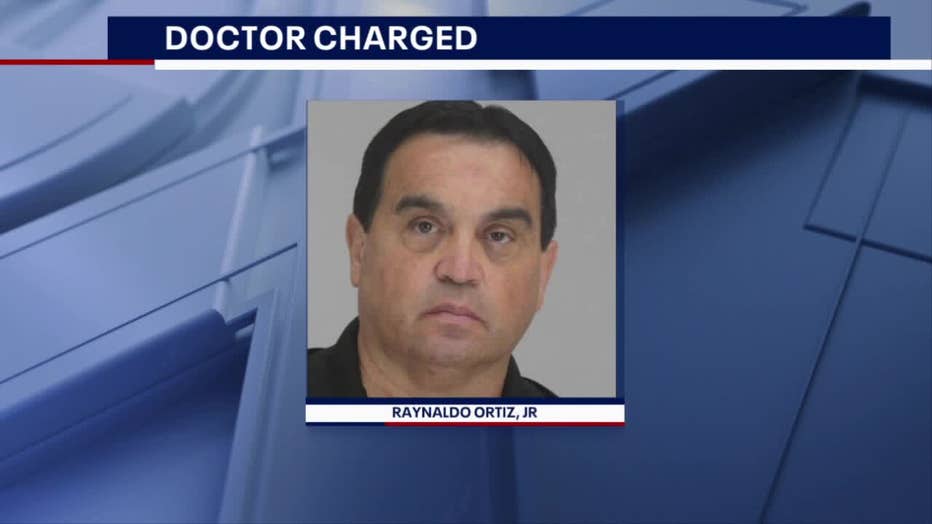Prosecution pushes Dallas doctor's struggling businesses as motive for IV tampering

Prosecution: Money motivated doctor's IV tampering
On Friday, the prosecution worked to show that Dr. Raynaldo Ortiz's two businesses were losing money, putting him in a desperate situation when his privileges were once again in question.
DALLAS - Prosecutors in the trial of a Dallas doctor accused of tainting IV bags worked on Friday to provide a motive for his alleged crimes.
Dr. Raynaldo Ortiz is accused of injecting dangerous drugs into IV bags at the Baylor Scott & White Surgicare in North Dallas, leading to 11 patients suffering cardiac emergencies and the death of a fellow doctor.

The prosecution worked to show that Dr. Ortiz's two businesses were losing money, putting him in a desperate situation when his privileges were once again in question.
The doctor had an expensive lifestyle.
His home in Murphy was valued at $1.3 million in 2022.

Court records at the time showed he also owned five luxury cars, including a Corvette and three Mercedes, but he also had financial troubles.
In court on Friday, Terri Burson, an officer manager for his two businesses, said he owed about $3 million to the IRS.
Ortiz's businesses, Assured Medical Billing Inc. and Garland Anesthesia Consultants, provided 20 anesthesiologists or anesthetists.
Burson testified that the businesses sometimes struggled to make payroll, and he was working on "getting a hospital in Allen."
In 2020, Dr. Ortiz relinquished his privileges at Baylor Scott & White Surgicare in Garland. The jury did not hear why, but we can tell you court records showed Dr. Ortiz "did not recognize the patient’s inadequate oxygenation and ventilation."
That patient had to be resuscitated with CPR.
In May 2022, records show a similar incident happened at the Baylor Scott & White Surgicare in North Dallas.

Why Dallas doctor accused of tampering with IV bags was allowed to practice while under investigation
Dallas anesthesiologist Dr. Raynaldo Ortiz Jr. was under investigation well before his arrest in connection with 11 patient emergencies and a doctor's death at the Baylor Scott & White North Dallas Surgicare Center.
A patient stopped breathing under Dr. Ortiz's care, prompting the surgical center to conduct a review.
Former U.S. attorney Paul Coggins says the government is working to establish a motive for Ortiz putting dangerous drugs in IV bags, an attempt to save his privileges, by trying to show emergency situations happen to a lot of doctors.
"It's not the direct motive evidence you could ever find. Direct motive evidence would have been if they could have shown, for example, the defendant had a grudge and targeted a particular patient, to go after a patient for a particular reason, but that doesn't appear to have happened," said Coggins. "The government doesn't have to prove motive. When the judge charges the jury he's will not charge them you have to find the motive. If you find the defendant did the act, did it intentionally and it caused the harm that you heard about, that is the violation."
A financial expert testified that Ortiz's business dropped from a gross revenue of $9 million in 2017 to $4 million in 2021.
The defense worked to show Ortiz's income from that business did not drop as dramatically.
According to the defense, it went from $3.2 million in 2016 to $1.7 million in 2020.
On Friday afternoon, a chemist took the stand and testified that IV bags he tested for the last two patients who experienced cardiac emergencies did have bupivacaine and lidocaine present.
READ MORE:
- Trial begins for Dallas doctor accused of putting heart-stopping meds in IV bags
- Dallas IV tampering trial: Administrators 'desperately' sought cause of spike in patient emergencies
- Husband of Dallas doctor who died from alleged tainted IV bag gives emotional testimony about her death
- Teen who survived alleged tainted IV bag testifies against Dallas doctor
- Anesthesiologist who realized IV bags were behind patient emergencies testifies in Dallas doctor's trial
The trial will not resume until Tuesday due to logistical issues.

